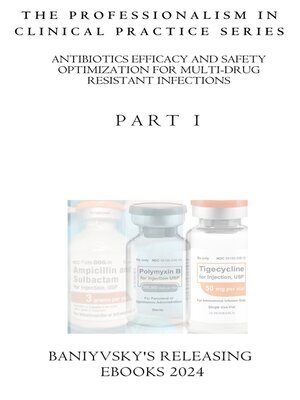THE PROFESSIONALISM IN CLINICAL PRACTICE SERIES
ebook ∣ ANTIBIOTIC EFFICACY AND SAFETY OPTIMIZATION FOR MULTI-DRUG RESISTANT INFECTIONS · PART I
By Clinical Pharmacy Specialist; MOH'D NOUR BANI YOUNES

Sign up to save your library
With an OverDrive account, you can save your favorite libraries for at-a-glance information about availability. Find out more about OverDrive accounts.
Find this title in Libby, the library reading app by OverDrive.



Search for a digital library with this title
Title found at these libraries:
| Library Name | Distance |
|---|---|
| Loading... |
This eBook release, titled "PART I," is part of the "PROFESSIONALISM IN CLINICAL PRACTICE SERIES." It specifically addresses the optimisation of antibiotic efficacy and safety for infections caused by multi-drug resistant bacteria. The eBook covers a total of twenty distinct topics. Each topic is divided into two parts: keypoints and their references. Each topic typically consists of an average of 12 key points that encompass the relevant subject matter. The following topics are entitled as:
Extended Treatment Regimens Of Synergistic Combination Therapy For Gram-Negative Infections In Critically Ill Patients, Limiting Shorter Courses Of Monotherapy
Antibiotic Treatment Strategies To Reduce Overuse In Gram-Negative Bacteria Cause Bloodstream Infections
Compared Icu Patients' Antibiotic Treatment Durations While Optimizing Pk/Pd Targets
Treatment Decisions For Using A 5-7-Day Short-Course Antibiotic Treatment, Should Be Reevaluated Regularly Based On Patient Response
Trimethoprim/Sulfamethoxazole Monotherapy Exhibits Inferior Outcomes In Comparison To Alternative Medications
A Monotherapy Approach And Shorter Courses Of Antibiotic Therapy May Be Effective For Gram-Negative Enterobacteriaceae
The Importance Of Antibiotic Stewardship Programs In Reducing Antibiotic Use And Preventing Recurrence
The Debate Over Gram-Negative Infection Treatment Focuses On Monotherapy And Combination Therapy
Gram-Negative Bacterial Infections Are Often Managed With Established Compounds Like Trimethoprim / Sulfamethoxazole And Fluoroquinolones, But These Often Result In Adverse Events And High Selective Pressure
Recent Meta-Analysis Studies Have The Potential To Alter Current Guidelines Regarding The Recommended Treatment For Stenotrophomonas Maltophilia Infections
Antimicrobial Susceptibility Testing Is Crucial For Understanding Stenotrophomonas Maltophilia Infections. Minocycline Is The Most Effective Agent, Followed By Tmp/Smx, Tigecycline, And Levofloxacin
Acinetobacter Baumannii Is A Hospital-Acquired Pathogen With High Mortality Rates And Improper Antibiotic Administration Being More Correlated With Mortality
Acinetobacter Baumannii, A Member Of The Eskape Pathogens, Is Responsible For Hospital-Acquired Infections Worldwide And Exhibits A Significant Morbidity And Mortality Rate. This Is Particularly True In Cases Involving Resistant To Carbapenems
Despite Efforts To Reduce Carbapenem-Resistant Acinetobacter Baumannii Infections, Staff Shortages Hinder Effective Infection Control Measures
Antimicrobial Stewardship Programmes Decreased Resistance Rates Significantly, But More Is Needed
The Infectious Diseases Society Of America Released A Revised Document On Treating Resistant Bacteria Like Enterobacterales, Ampc, And Pseudomonas Aeruginosa
The Infectious Diseases Society Of America Recommends Treating Resistant Infections, And Seeking Expert Advice Is Recommended
Treatment Duration For Resistant Infections Depends On Host Factors And Oral Therapy May Be Considered
Meropenem, Imipenem-Cilastatin, Or Ertapenem Are Recommended Carbapenems For Esbl-E Infections, Except Urinary Tract Infections
Ampc Β-Lactamases, Enzymes Produced By Enterobacterales And Glucose Nonfermenting Gram-Negative Organisms To Recycle Cell Walls







